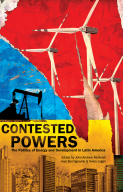Contested Powers: The Politics of Energy and Development in Latin America

Based on extended case study research in Latin America, this edited volume examines the interactions between local and international politics in contests over natural resources required for the production and consumption of energy.
Embedded in sociological and anthropological debates on development, power and modernity, the authors critically analyse different meanings and values attributed to resource sovereignty. They also embed manifestations of the concept into global debates on the division of labour and nature. They take three prominent energy and development discourses (“energy equals development”, “resource curse”, and “creative economy”) as entry points to explore how resource sovereignty in relation to social territorialism can be articulated.
Latin America’s economy is highly dependent on energy resource extraction, and its development trajectory is closely linked to resource commodity prices. Further, the region stands out as very innovative in regard to energy generation experiments, and hosts several mega projects. However, the actual practices of access to energy, and its distribution and pricing, are intensely debated, highly contested and conflict laden in Latin American politics.
Each chapter of Contested Powers provides in-depth analysis of a particular case study, such as:
· social conflicts between environmental conservation and large-scale extraction by private mining companies, which additionally created a corridor of drug trafficking and illegal cattle ranching in the territories of the Maya Biosphere Reserve in Guatemala
· nuances of the electrification of Nicaragua, where privatization clashed with strong notions of national sovereignty and entitlement to electricity
· smuggling of fuel between Bolivia and Peru, legitimized by unemployment and lack of opportunity
· a critique of the now globally established cultural approach of the Sistema youth orchestras, which originated in Venezuela.
In sum, the case studies show readers how complex it is for Latin American states to arrive at a coherent approach to energy politics. They also demonstrate how energy issues can serve as a crucial element to contest power and challenge the concept of resource sovereignty. While certain organized groups, such as the working class, indigenous peoples, and urban social movements, partially succeeded in reclaiming power over their resources in Latin America, this has not been at the expense of elites. This emphasizes that power in energy politics is not a zero-sum game.
Book note prepared by Julia Wesely
Search the Book notes database
Our Book notes database contains details and summaries of all the publications included in Book notes since 1993 - with details on how to obtain/download.
Use the search form above, or visit the Book notes landing page for more options and latest content.
For a searchable database for papers in Environment and Urbanization, go to http://eau.sagepub.com/

